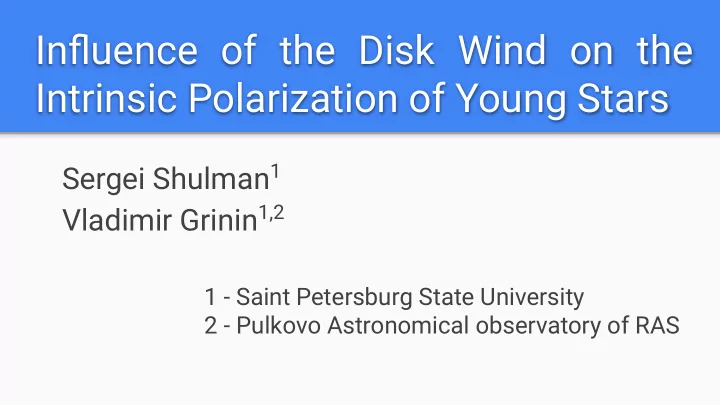

Influence of the Disk Wind on the Intrinsic Polarization of Young Stars Sergei Shulman 1 Vladimir Grinin 1,2 1 - Saint Petersburg State University 2 - Pulkovo Astronomical observatory of RAS
UX Ori Type Stars Intermediate mass, pre-main sequence Herbig Ae/Be stars with a specific type of variability: ● The light curves show Algol like fadings up to 2-3 magnitudes ● random intervals of days to weeks between fadings ● changes in color ● increase in linear polarization to 5-8%
Conservative Model Grinin (1988): ● Compact gas-dust clumps (clouds) ● Linear polarization positional angle has no changes ● Explains the majority of events Natta and Whitney (2000): eclipse models for a thin disk
UX Ori Deep Minimum Grinin et. al. (1994)
Tasks ● Expand conservative model for a star with a circumstellar disk puffed up in the inner region. ● Study eclipses caused by large scale circumstellar disk perturbation
Directions Grid Enumeration Method Effective three-dimensional dust radiative transfer based on enumeration using the directions grid and the law of total probability. Finite number of discrete levels of photon packets properties. ● No random noise. No need in realization statistics. Photon packets always have correct distributions. ● Neighboring realizations can be kept effective. (Shulman, 2018)
Disk and Wind Models The disk puffing in the dust sublimation zone is produced by a disk wind. Safier (1993):
Disk Puffing Up (a) no wind F 10 -8 M ⊙ / year (b) C 10 -8 M ⊙ /year (c) C 5 10 -8 M ⊙ / year (d)
Polarization - Magnitude
Color Shulman & Grinin (2019)
Results ● The position angle of polarization may differ by 90 o on different wavelengths (Pereyra et al. 2009) ● The polarization may not change during the eclipse (Rostopchina-Shakhovskaya et al. 2012) ● There can be no reddening of the star: color indices may decrease during the all fading (Grady et al. 1995) ● Large scatter of polarization parameters at the same brightness level is possible (Rostopchina et al. 2000)
Disk Perturbation
● Disk perturbation causes an eclipse and the change of the linear polarization positional angle ● Huge perturbations do not lead to the observed changes of the positional angle
Results ● The perturbation of a thin disk leads to small changes of the linear polarization positional angle ● If the disk has a puffing up, the positional angle change may be up to 60 o ● Thick disk may also have the linear polarization positional angle changes up to 30 o ● The results depend on the puffing up model and wavelength significantly.
Thank you for attention!
Recommend
More recommend